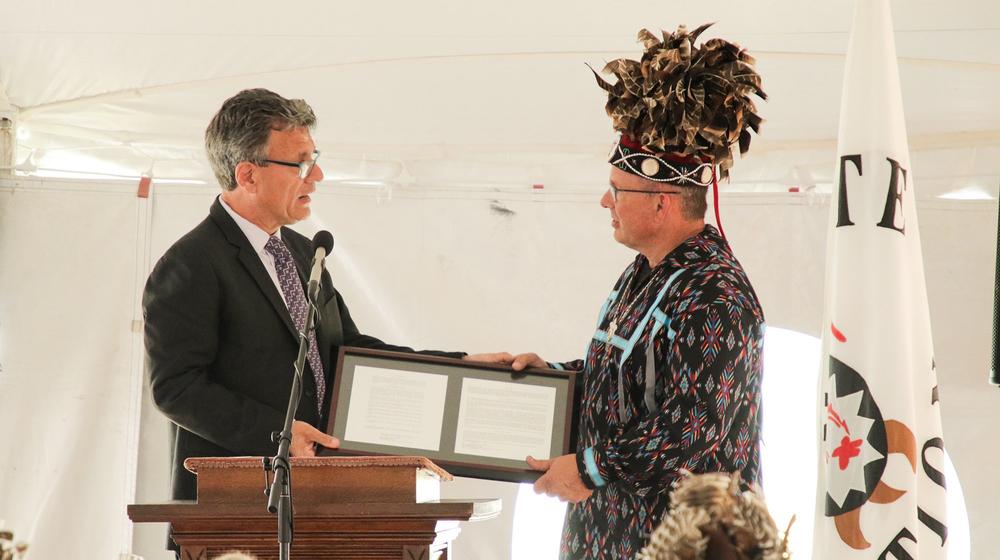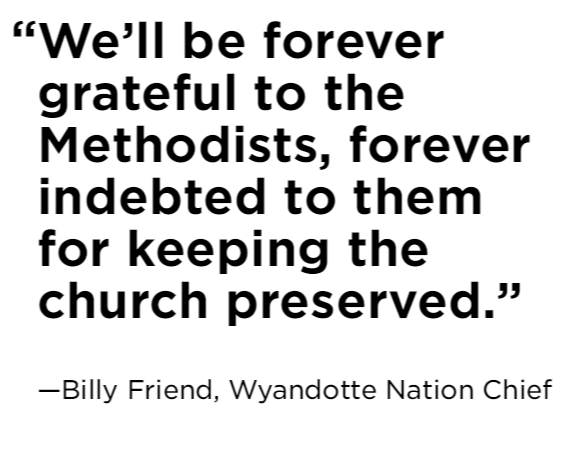Section Branding
Header Content
Atlanta Ministry Gives Back Land To Native American Nation After Nearly 200 Years
Primary Content
An Atlanta-based ministry and a Native American tribe recently came together to fix a nearly 200-year-old injustice.
When the federal government forcibly removed the Wyandotte Nation from Ohio in 1843, the tribe gave 3 acres of its sacred land to the United Methodist Church to protect and maintain.
Today, the land includes the original 19th Century Mission Church as well as a Christian cemetery and a Native American burial ground.
During the September ceremony, the church formally returned the deed to the land back to the nation.
The Global Ministries of the United Methodist Church is now based in Atlanta.
GPB’s Rickey Bevington spoke to Ministries' General Secretary Thomas Kemper about the historic land tranfer and the link between the two groups.
Rickey Bevington: Tell me more about the early relationship between the church and the Wyandotte Nation.
Thomas Kemper: John Stewart was our first missionary in the tradition of what today is Global Ministries. In 1816, he went to be in mission among the Wyandottes in Ohio. He was a black man, which was very unusual, at that time, to be our first missionary, coming from that background.
He went to live and farm with the Wyandotte, and what really drew them to him was his singing, more than even his teaching. Even the chief and everybody was talking about that importance of the singing.
He created, I think, a very respectful relationship because not always missionaries and indigenous people had the best relationship, very often it led to death and the destruction of a culture. But here it was really a moment where the two came together in a life-giving moment, I believe.
Bevington: Why did you decide to return the land in northern Ohio?
Kemper: We felt it was time to return the land. It was given to us in trust. It was a very emotional moment. You have to imagine that basically for 176 years some Methodists kept this land and cared for it.
They kept the church going, the building up and now it was really time to say to the Wyandottes, "Now, you take it back, and we have done what we had promised."
Bevington: Describe that day of the ceremony and you were there. You handed the deed back to Chief Friend. Talk about the feelings on both sides among church members and Wyandotte Nation members.
Kemper: It was extremely emotional. I was there, at the moment, when I handed the deed to the chief, and the chief had tears in his eyes. So I had some words prepared, but my voice cracked at that moment because I saw the tears in his eyes. I started to cry. There were 600 to 700 people in the open air really witnessing this moment, and it was deeply emotional.
Bevington: The Wyandotte did donate $10,000 to contribute to the upkeep of the church on the land because the Methodist still run the church but not the land itself. How will the UMC maintain the relationship in the future?
Kemper: We have clearly said to the Wyandottes and to Chief Billy that we want to continue this relationship even though we have given the land back and the church building back to the Wyandotte.
Through the local United Methodist Church, which is called the Jon Stewart Memorial Church, they will continue the upkeep because the Wyandottes are all in Oklahoma. So they need some local presence, and that will be through the United Methodist Church.
Bevington: Global Ministries is relatively new to Atlanta, so just tell me a little bit more about why you moved down here from New York after 200 years.
Kemper: We were, for 200 years, in New York, and, of course, times have changed. No missionaries are going by boat into any foreign country anymore. Our missionaries, now, are from everywhere to everywhere, we say, so half of our missionaries are not from the U.S.
They could be from Africa, from Brazil, from Japan or the Philippines, so we have become a far more international mission organization.
The Atlanta airport was one very important argument for us [to move to Atlanta]. We needed a place where we could be really easy in many places in the world. We have a strong United Methodist Church in Georgia.
We have Emory University, which is Methodist-related, and we work also with quite a few health institutions here in the city because global health is one of the emphasis of our work.
The Wyandotte Nation, Then And Now
The Wyandotte Nation were part of the Huron Confederacy and moved to Detroit in the 18th Century.
They later settled in Ohio where they were the last tribe in the state to be forced out by the Indian Removal Act on 1830.
The Wyandotte were also instrumental in the founding of both Detroit and Kansas City, Kansas, over the course of their tribal history.
Today, there are more than 6,600 members with about 1,500 in Oklahoma. The rest are spread out across the country.





